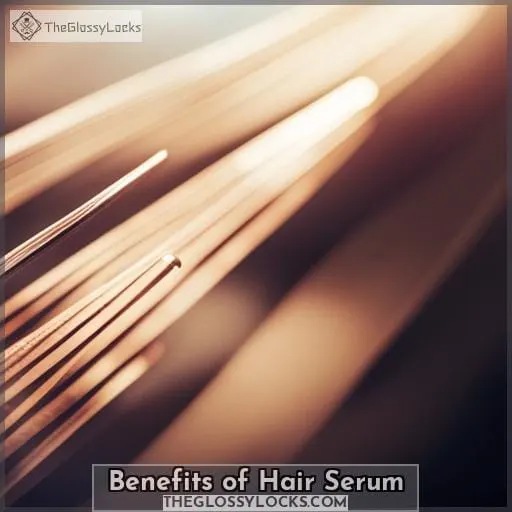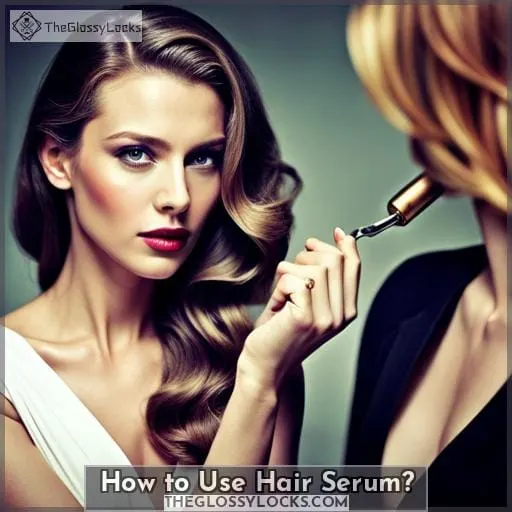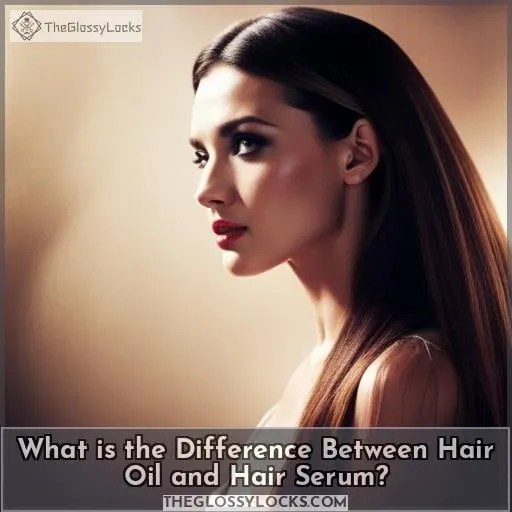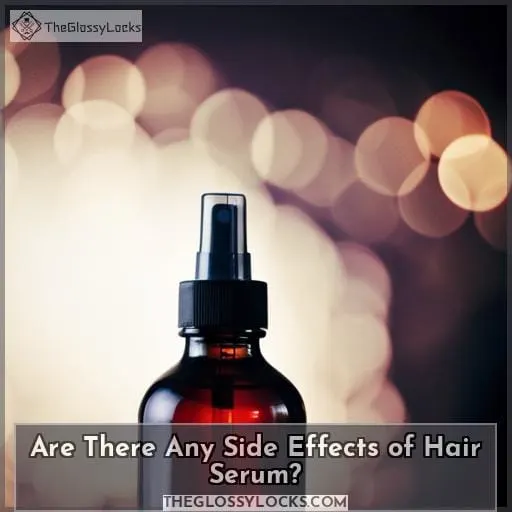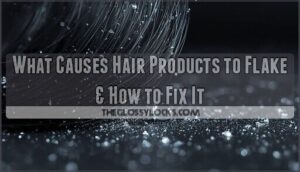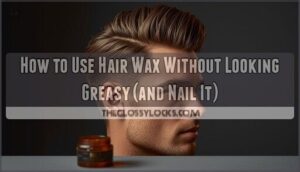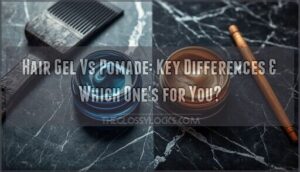This site is supported by our readers. We may earn a commission, at no cost to you, if you purchase through links.

Well, the answer is yes! Hair serums can be a great way to repair damage from heat styling and environmental pollution.
But what should you know before applying this miracle product on your scalp? Read ahead as we explore whether or not it’s safe to apply a hair serum directly onto our scalps and how much is enough for optimal results.
Table Of Contents
- Key Takeaways
- What is Hair Serum & How Does It Help?
- Benefits of Hair Serum
- How to Use Hair Serum?
- How to Pick the Right Serum for Your Hair Type?
- Can I Apply Hair Serum on My Scalp?
- Is Hair Serum Necessary for Hair Care?
- Can I Use Hair Serum Daily?
- What Should I Do if I Put Too Much Serum in My Hair?
- What is the Difference Between Hair Oil and Hair Serum?
- Are There Any Side Effects of Hair Serum?
- Conclusion
Key Takeaways
- Hair serums should not be applied directly to the scalp to avoid greasiness.
- Hair serums provide surface-level benefits like shine and frizz control.
- Hair oils penetrate deeper, while serums provide instant gloss and protection.
- Avoid applying serums directly onto the scalp to prevent irritation.
What is Hair Serum & How Does It Help?
You can achieve healthier, smoother hair by using a serum to nourish and protect your locks. Hair serums are lightweight products that provide hydration and protection from damage caused by styling or environmental factors.
Serums come in various forms, such as oils, gels, creams, mousses, or sprays. They help control frizz while adding moisture and shine to your tresses – plus they can also be used on the scalp for added benefits!
It’s important to choose the right serum based on your hair type. Those with oily scalps should opt for lighter formulas like oil-free gel serums, whereas those with dry scalps may benefit more from heavier cream-based serums containing keratin for deep conditioning effects.
When applying a serum onto the scalp, it is best done before showering after towel drying so that you don’t end up washing away its beneficial properties when shampooing afterwards! Additionally, avoid overusing as this can cause greasiness.
Benefits of Hair Serum
Are you searching for the perfect product to maintain your hair’s health and shine? Hair serum offers numerous benefits, including smoothing, damage repair, and protection against pollution. With its versatile properties, this product is an excellent choice for all hair types.
Smoothing and shine
Smoothing and providing a glossy shine, hair serum can help you achieve enviable locks with just one application – an ounce of prevention is worth a pound of cure. From scalp application to frequency of use and selection, here are the benefits: Scalp application should be avoided; select according to your hair type; frequent use may result in greasiness; enhances shine without weighing down strands; ideal for styling colored or damaged hair.
Damage repair
Damaged hair gets an instant boost with the right serum, restoring its shine and strength. Applying to clean, washed hair works best for damage repair, while scalp application should be avoided as it can disrupt your scalp health.
Salon treatments or natural alternatives like coconut oil are better suited for different concerns, such as frizz-free hair or heat styling protection.
Pollution protection
Shield your tresses from environmental stressors with a hair serum to protect them. Pollution protection serums are designed for daily use and can be applied directly to the scalp or on damp hair after towel drying.
Look out for ingredients that combat pollution, such as antioxidants and vitamins, in the product. While myths about using serums may lead you astray, remember it’s key to choose one suited for your hair type.
Look for serums featuring natural oils like argan oil or jojoba oil, which provide nourishment and hydration while protecting against external damage caused by air pollutants.
Get ready to flaunt healthy-looking locks!
How to Use Hair Serum?
When it comes to using hair serum, timing is of the utmost importance. To get the most out of your serum and reap all its benefits, you should apply it after towel-drying but before heat styling on damp hair.
For best results, use only a small amount as too much can lead to greasy-looking strands.
When to Apply
When it comes to using hair serum, proper timing is key – apply it after towel-drying your hair but before styling for the best results. Avoid applying directly to the scalp and use sparingly; a little goes a long way.
How to Apply
Transform your tresses with a few steps – warm the serum in your palms, then evenly distribute it through hair lengths. Avoid applying to the scalp – it will not offer any benefits and may cause greasiness.
Take time to select the right serum based on type and concerns for maximum effectiveness. For best results, apply before heat styling for protection against UV damage; use sparingly as excessive usage can lead to damage over time.
How Much Should You Use
You should be mindful of how much serum you use – too much can make your hair greasy, so ask yourself: How little is enough? When applying to the scalp, go sparingly and focus on areas where you have concerns.
To keep your hair from becoming oily or weighed down with product buildup, distribute the serum evenly through towel-dried hair using just a tiny amount warmed between palms.
How to Pick the Right Serum for Your Hair Type?
Are you struggling with dry, frizzy hair? Do split ends and heat damage from styling tools have you worried about the health of your strands? If so, it may be time to consider a serum specifically designed for your hair type.
A good-quality serum can help repair damaged locks while also creating a protective barrier against environmental pollutants. Whether you’re dealing with thick or dry hair, there is surely an ideal product out there that will work best for you.
Dry and Frizzy Hair
Tame your dry and frizzy hair with a serum designed to address those specific issues. Choose one that offers scalp application, frizz control, and relief from dryness. Use sparingly for maximum effectiveness; frequency varies based on hair type. Keep in mind that serums are different from oil formulas – they provide surface-level protection rather than deep penetration of the follicles.
Split Ends
Split ends can be a real challenge, but with the right hair serum, they’re no match – snip away split ends and keep your mane looking marvelous! Find serums containing natural ingredients like rosemary to prevent further damage.
For colored hair, choose keratin-based formulas that protect from heat styling. Apply from the scalp to tips for maximum protection against breakage and frizz.
Damaged Hair Due to Heat and Pollution
Protect your tresses from heat and pollution damage with a hair serum tailored to your hair type! With scalp health in mind, look for serums designed for protection against environmental aggressors. Reap the benefits of improved hydration, shine, and frizz control while protecting your locks from further damage.
Pollution-fighting ingredients will help keep strands looking healthy despite exposure to pollutants.
Dry Hair
Revive your dry hair with the perfect serum that will hydrate and nourish your locks. Scalp application is not recommended as it can cause rashes; instead, apply to damp hair after towel-drying for maximum benefits.
Thick Hair
For thick hair, choose a serum containing keratin and jojoba oil – studies have shown that these can increase shine by up to 70%. Haircare experts recommend avoiding applying the serum to the scalp, but instead focusing on the lengths for optimal results.
Use serums specifically formulated for dandruff or other scalp health concerns. Styling products with heat protectant properties are also beneficial for thicker locks.
Can I Apply Hair Serum on My Scalp?
It’s important to know when it’s suitable to apply hair serum on your scalp. While serums are designed for the surface level of your hair, they can also be used sparingly around the scalp to provide some extra protection and gloss.
However, you should keep in mind that greasiness may result from applying too much product directly onto the scalp. To prevent this, select a lightweight serum or cream-based one according to your hair type and concerns.
Adding keratin-containing serums to your styling routine is ideal for colored or styled locks as well.
When using serums directly on the scalp during styling sessions, remember not to overuse them – just enough will do! Avoid applying more often than necessary, as prolonged use can lead to damage on top of existing issues such as dullness and frizz caused by environmental factors like pollution.
A little goes a long way, so pay attention when selecting products with ingredients that address specific needs, such as rosewood for hydration or lavender oil for repairing damaged strands.
Haircare doesn’t have an exact science, but understanding what works best based on personal experiences makes all the difference!
Is Hair Serum Necessary for Hair Care?
Discovering if hair serum is necessary for hair care can depend on the type of hair you have and what concerns you’re trying to address. For instance, up to 97% of women who used a keratin-containing serum found that it improved their styling experience.
Hair serums offer many benefits, including pollution protection, smoothing, detangling, shine, and damage repair. Whether scalp application is recommended depends on your individual needs. Daily use should be avoided as excessive product build-up will lead to greasiness or clogged pores, which can cause irritation or acne breakouts.
The choice between serum and oil comes down to what works best for your particular issue. While oil penetrates deeper into the follicle structure, offering more nourishment over time, using a lightweight serum offers surface-level gloss and frizz control without weighing down fine locks or curls.
Remember that not all products work alike, so find one that’s tailored exactly to your needs. Apply it cautiously before heat styling for maximum benefit. Never apply it directly onto the scalp, as this could cause adverse effects.
Instead, warm it slightly in your hands first before distributing it evenly throughout the length of your strands with gentle brushing afterwards.
Finally, understand when too much has been applied by recognizing signs such as dullness or hard-to-manage texture. Take appropriate action with dry shampoo and brush out any excess residue from the roots before continuing with your styling routine.
Can I Use Hair Serum Daily?
Hair serum is an essential part of any hair care routine and can offer many benefits. But should you use it daily? Generally, daily application of a hair serum isn’t recommended as overuse can lead to scalp concerns such as irritation or even greasiness.
For those who want to apply a product every day, there are lighter alternatives that still provide the same results without the risk of overusing serums—such as dry shampoos. Dry shampoos help absorb excess oil in your locks while keeping your strands looking smooth and healthy.
To make sure you’re using products safely, be mindful not to shampoo too often or condition more than once per week.
If you must use a serum on days when styling with heat tools is necessary, always remember: less is more! A little bit goes a long way in providing some much-needed protection against harsh temperatures without weighing down tresses later on.
Ultimately, understanding what works best for each individual’s unique needs—and how frequently they need it—is key in achieving optimal levels of haircare success!
What Should I Do if I Put Too Much Serum in My Hair?
If you’ve put too much serum in your hair, try brushing it out with a wide-toothed comb and then shampooing twice to remove any residue.
To avoid having to do this in the future, be mindful when applying serum, especially on scalp application. Start by adding a small amount onto your hands and rub together before distributing throughout damp hair evenly.
Focus more on mid-lengths and ends than roots as excess product can create greasy-looking locks or weigh down fine strands.
When styling colored or chemically treated tresses, use keratin serums for extra protection from heat tools while also controlling frizziness without making them look limp or weighed down. Don’t overuse – only apply enough so that you can see shine but not at all times as prolonged usage could cause damage instead of providing benefits like smoothing, detangling, etc.
The key is finding the right balance between using too little versus too much serum depending upon an individual’s needs and lifestyle habits such as frequent washing vs infrequent washings, which determines how often one should use their chosen product type for best results!
What is the Difference Between Hair Oil and Hair Serum?
Comparing hair oil and serum to understand their differences can help you find the best product for your hair’s needs. Hair serums are designed to smooth, protect, repair damage, and offer a glossy finish. They work on the surface of your strands without penetrating deep into the scalp like oils do.
Serums should be applied after washing with warm hands directly onto damp locks so they provide extra protection from heat styling tools while taming frizz or flyaways. On the other hand, oils penetrate deeper through each strand which helps nourish dry ends but may leave an oily residue if used too often or too liberally on fine hair types that lack volume.
When selecting between these two products, it’s important to consider which benefit you need most: hydration or shine? Oils will help with hydration while serums give an instant gloss boost.
When applying either one, make sure not to apply directly onto the scalp as this could cause irritation due to its sensitivity.
Are There Any Side Effects of Hair Serum?
It’s important to understand the differences between hair oil and serum when considering what products you should be applying to your scalp. Hair serums work on the surface level of hair, offering benefits like frizz control and protection from heat styling.
When used properly, they can replace conditioners in some cases. However, there are potential side effects if not applied correctly.
Scalp sensitivity is a possible issue as too much product can cause irritation or allergic reactions. Applying serum directly to the scalp may also alter texture. Excessive buildup could occur over time, leading to unhealthy looking strands that lack luster or shine.
For best results, apply sparingly only after towel-drying damp hair. Focus on ends rather than roots for protection without damage or buildup occurring at the root area of your head!
Conclusion
The sun’s golden rays are a symbol of the power of hair serum and how it can transform your hair. Hair serum is a powerful tool that can help improve the look and feel of your hair in various ways. It can add shine, smooth out frizz, repair damage, and protect against pollution.
When used correctly, it can be an effective part of a haircare routine. However, it’s important to note that it shouldn’t be applied to the scalp. Applying serum to the scalp can lead to greasiness and hair damage. Thus, it’s important to choose the right serum for your hair type, apply it properly, and use it sparingly to get the most out of it.
Ultimately, the decision to use hair serum on a regular basis is up to you. With the right knowledge and understanding of how to use it, you can achieve healthier and shinier hair.


